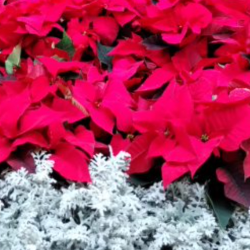Poinsettias and Plant Conservation
Poinsettias, known for their bright red and green foliage, are popular during the holiday season and originally come from Mexico. Plant conservation efforts aim to protect species like wild poinsettias by preserving natural habitats, supporting seed banks, and promoting sustainable cultivation. These actions help maintain biodiversity and protect ecological balance for this nostalgic holiday symbol; so that future generations will experience it, as well.
History of the Poinsettia
The poinsettia (Euphorbia pulcherrima) was first introduced to the United States by Joel Roberts Poinsett, the first U.S. ambassador to Mexico, in the 1820s. He was fascinated by the vibrant plant and brought cuttings back to his home in South Carolina. As a reault, December 12th is now celebrated as National Poinsettia Day in his honor.
Cultural Significance
In Mexico, the poinsettia is known as "La Flor de Nochebuena," or "Flower of the Holy Night." It is deeply rooted in Christmas traditions, symbolizing purity and celebration. Today, millions of poinsettias are sold each holiday season, making it one of the most commercially successful potted plants in the U.S.

Conservation Strategies
Conservation of wild poinsettia populations requires coordinated action. Key strategies include:
- Habitat Protection: Safeguarding natural environments where wild poinsettias grow.
- Seed Banking: Storing seeds in protected facilities for future restoration efforts.
- Public Awareness: Educating growers and consumers about sustainable sourcing.
- Research Support: Funding studies on wild populations and climate resilience.
Fun Facts About Poinsettias
- The "flowers" of poinsettias are actually colored leaves called bracts.
- They come in many colors including red, pink, white, and even marble or speckled varieties.
- Despite myths, poinsettias are not deadly to pets, but eating large amounts can cause mild irritation.
- Over 70 million poinsettias are sold in the U.S. every year